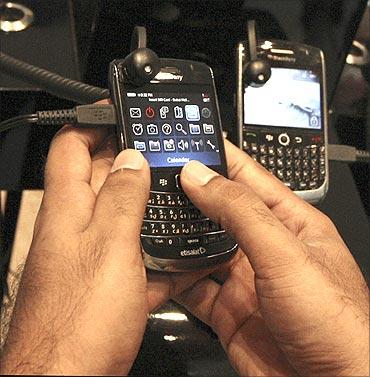
Will BlackBerry be banned? Those who possess these handsets are probably losing sleep over this question at the moment.
BlackBerry owner Research in Motion is at odds with the governments of India, Saudi Arabia and the United Arab Emirates over their demands that the company let authorities tap BlackBerry messages delivered using RIM's rock-solid encryption technology.
One of the smartest phones in the market, the BlackBerry is now at the centre of a controversy. With security fears raised by several governments across the world, the pressure is mounting on BlackBerry to find a solution to this crisis which threatens its business across continents.
According to media reports, Saudi Arabia's telecom regulator and telecom operators have reached a preliminary agreement with Research in Motion. It has delayed the the ban on Blackberry's messaging service and asked mobile operators to test solutions offered by RIM.
The Indian government is targeting two services as potential security threats, the BlackBerry enterprise services and the BlackBerry Messenger.
The government has so far been able to intercept and monitor voice-calls, SMSes, and emails on BlackBerry phones. But enterprise services and the Messenger cannot be tracked.
The government warned that it would block BlackBerry-to-BlackBerry Messenger service if RIM does not offer a solution to monitor messages within a week.
. . .
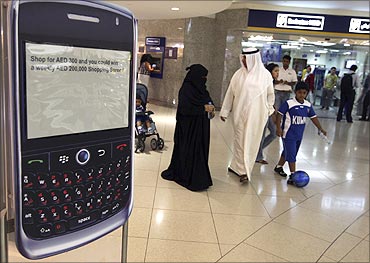
The Messenger offers a chat option to BlackBerry users and the enterprise services allow BlackBerry customers to create their own unique keys to communicate between themselves. India, with over 11 lakh (1.1 million) BlackBerry users is one of RIM's (Research in Motion's) growing markets.
Ironically, for customers who opted for BlackBerry's email security over Apple and Nokia's hi-tech phones, this development is a big setback.
"This is about the Internet -- everything on the Internet is encrypted. This is not a BlackBerry-only issue," Michael Lazaridis, co-founder and co-CEO of RIM, said in an interview with The Wall Street Journal.
"If they can't deal with the Internet, they should shut it off. But we are going to continue to work with them to make sure they understand the reality of the Internet. A lot of these people don't have PhDs, and they don't have a degree in computer science."
What should the users do now? Experts' views
At this moment, even the experts are in a tizzy and don't have definite answers to the problem.
In an e-mail interaction with rediff.com, global telecom analyst Jeff Kagan made the following observation: "To tell you the truth this is the first time this has occurred so we really don't know what will happen next."
. . .

"RIM BlackBerry is very popular across the world and there has never been this kind of issue. I know users are wondering what is coming next. I think everything depends on time and we don't know what will happen in future," said Kagan.
"Since users cannot control what a government allows, they should be prepared to switch if they have to. However, I would not rush to switch in case all this gets settled."
"If I were a user I would be looking around for a carrier and device that I could buy if I need to. Then if the ban happens, s/he can buy that device quickly."
Another telecom expert Pradeep Chakraborty, however, has rather radical views. He squarely blames the users for the security concern.
"I don't see any reason why someone needs to be connected to the Internet 24/7. If a security concern is an issue now, the users are to blame for it," the Bengaluru-based analyst told rediff.com over phone.
"If your boss sends you an e-mail at 11 in the evening, why do you need to check it at that very moment when you can act upon it only the next day?"
. . .
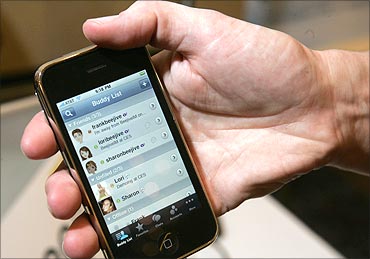
Chakraborty is of the opinion that our 'obsession' with the Internet will lead to security issues with other mobile operators as well.
A mobile operator's view
A BlackBerry user from Mumbai, Samit Chanda (name changed on request), called up Vodafone to get himself updated on the issue.
"The Vodafone technical support team, while initially reluctant to say anything, however later insisted that only the BlackBerry messenger service was the 'problematic' and that could be stopped. The e-mail service on BlackBerry would continue as usual," said Chanda.
"For, they reason, the government can access (probably already accesses) users' e-mail accounts (gmail, rediffmail, etc) which BlackBerry has no control over. The BlackBerry messenger is a service between two BlackBerry users and that is something the governments can't keep a tab on. Therefore, for security reasons, that is what the government wants banned," Chanda added.
Chanda was somewhat relieved to get this information as his phone would not turn into a paperweight overnight.
"I can survive without using the Messenger," he consoled himself.
However, there has been no communication to the mobile operators in this matter from the government yet.
. . .

Sanjay Vijayakumar, co-founder and CEO of MobME Wireless Solutions, shrares his views on the BlackBerry controversy.
Is the BlackBerry service being misused?
BlackBerry service is a highly successful one in India as well as globally as you can see from smart phones sales reports. It is a possibility that the service is being misused. So the Indian government and other states are justified in raising their concerns.
Why is BlackBerry not setting up a server in India?
It is not just about India. . . every other country is asking the same question. Theoretically, one only needs access to the server as the data is protected and encrypted end-to-end so physical location doesn't really matter.
It does when the government wants strategic control over the same.
Is India's demand justified? To what extent can service providers help the government in monitoring?
Yes, I feel that safety of the country is paramount, but the counter argument is that it's not just BlackBerry. There are many other options on the Internet to send encrypted messages but that doesn't lead to Internet being banned.
Telecom service providers are already helping the government agencies in terms of monitoring. The BlackBerry issue is something that the company will have to address.
. . .
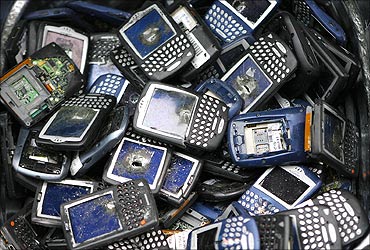
What will happen to people who have paid thousands of rupees to buy BlackBerry handsets?
The handset can still be used as the contention is only over the encrypted BlackBerry service. Thus, the ban would lead to email/messenger services getting affected. The irony is that these features were the USP of the phone. However, regular SMS and voice services can still be used.
How can this problem be resolved?
An amicable solution would be giving access to the servers to intelligence agencies. However, there is no clarity in the matter as lately BlackBerry has itself come out with a statement that they themselves do not have the keys.
What does the BlackBerry user say?
"I like my BlackBerry as I can get instant messages and it is very efficient. It has helped me a lot to be in touch with my clients abroad. However, if there is a security problem, it would be better to ban the service," says P K Abhay Kumar, managing director, Trium Marketing Consultancy Pvt Ltd.
"The Indian government should pressurise the Canadian government to ensure that our intelligence agencies can decode the messages in the interest of India's security," adds Kumar.
. . .

So what is the highly secured BlackBerry code all about?
All BlackBerry traffic runs through RIM data centres, which help manage the devices. It also runs through BlackBerry servers, which encrypt and unscramble messages.
However, RIM said in its statement that under its security system customers have their own encryption key and 'only the customer ever possesses a copy' of that key.
RIM said it does not have a master key and there is no back door that would let it or any third party gain unauthorized access to the key or corporate data.
RIM uses codes to scramble, or encrypt BlackBerry messages. Its advantage: if a worker loses a BlackBerry, RIM can wipe the messages and deactivate it.
According to RIM, BlackBerry's security architecture was designed to exclude RIM or any third party from reading encrypted information under any circumstances.
RIM argues it cannot unscramble its clients' data because the servers are located on the premises of its customers.
While the high level of encryption on data transfers has been one of the biggest advantages for many BlackBerry subscribers, this has now turned out to be a grave security threat for many Asian countries.
With a BlackBerry, a user can have instant and encrypted communication with another, simply by calling the other person's unique four character number.
. . .

What has been BlackBerry's USP?
BlackBerry was among the first phones where mail updates hit the phone like a short messaging service, or SMS. Hence it instantly struck a chord with the corporates and entrepreneurs on the move.
In time, companies began buying BlackBerrys not just for their senior managers, but also for their mid-level management employees.
Therefore, India Inc's concern over a possible ban is well justified.
Today a single BlackBerry can be used to: communicate over voice and e-mail, stream video, conferencing, and also to browse the cyberspace.
What are other companies saying?
Swedish telecom equipment maker Ericsson said vendors should be exempt from sharing 'source code' of hardware, as it was proprietary information, and sought toning down of penal provisions in case of security breach.
Ericsson, which has supplied equipments to leading GSM mobile operators such as Bharti Airtel, Idea and government owned BSNL and MTNL, said: "Source code is vendor's proprietary information and most valuable asset of the company."
. . .
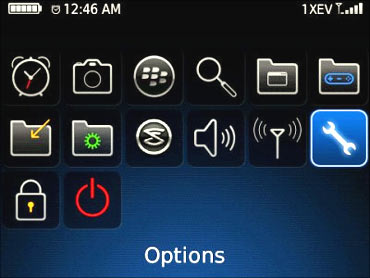
Does the company offer access to its systems in other countries?
Saudi Arabia, India and the United Arab Emirates have alleged that RIM gives a preferential treatment to countries like the Unites States.
American authorities can seek a court order to tap BlackBerry traffic, giving them access to messages sent over the network. However, RIM has not confirmed this.
What do BlackBerry's supporters say?The United States weighed in on the matter, saying it was disappointed and that the UAE was setting a dangerous precedent in limiting freedom of information.
"We are committed to promoting the free flow of information," said State Department spokesman P J Crowley. "We think it's integral to an innovative economy." The Canadian government and media have also strongly backed RIM.
What does the Indian industry think about the controversy?
Most of the corporate heads and senior employees use the BlackBerry.
They believe that business executives need a secure medium to communicate while traveling as well. For many executives, BlackBerry has become an indispensable part of their lives. A ban would affect their effective mode of communication.
. . .
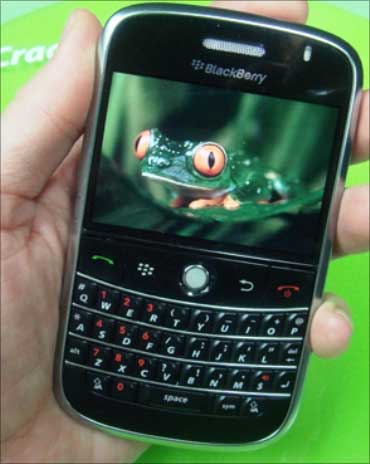
Which countries are planning to ban the BlackBerry service?
India, Saudi Arabia, Kuwait, Indonesia, the UAE, Lebanon and Algeria have all raised concerns about the encrypted code. Saudi Arabia has taken the decision to ban the services.
The UAE plans to ban BlackBerry Messenger, email and web browser services from October 11. In Saudi Arabia, telecom operators were asked to ban the Messenger option from August 6, but have been given a 48-hour reprieve with Riyadh and RIM striking some deal that reportedly involves installing BlackBerry computer servers in the kingdom, which might allow the Saudi government some access to user's data.
US' stand on the issue sole ray of hope
According to a PTI report, the US has initiated talks with India, United Arab Emirates and Saudi Arabia, besides RIM to address the 'legitimate' security concerns of these nations.
"We are reaching out to those countries -- the UAE, Saudi Arabia, India and others -- to understand the security concerns and see if we can't work collaboratively to find solutions," Crowley said.